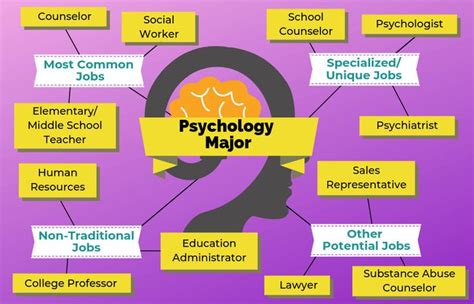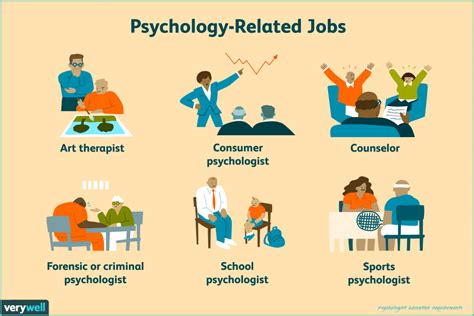Careers For Psych Majors

Psychology is a fascinating field of study that delves into the intricate workings of the human mind, behavior, and emotions. As a discipline, it offers a diverse range of applications and career paths that extend far beyond the traditional clinical or counseling roles. In fact, a degree in psychology can open doors to numerous industries and professions, many of which may not immediately come to mind when considering the field.
For students pursuing a Bachelor's degree in psychology, the potential career paths are endless. The skills and knowledge gained from this degree, such as critical thinking, research methodologies, and an understanding of human behavior, are highly transferable and sought after by employers across various sectors. From healthcare and education to business and social services, psychology graduates are equipped with a unique skill set that can make them invaluable assets in many different professional environments.
Exploring Career Options for Psychology Majors

Psychology, often considered a broad field, presents an array of career avenues that cater to diverse interests and skill sets. Whether you’re fascinated by the intricacies of the human mind, motivated by helping others, or drawn to the practical applications of psychological theories, there’s a niche waiting to be explored. Let’s delve into some of the most popular and promising career paths for psychology majors.
Clinical and Counseling Psychology
Perhaps the most well-known career path for psychology majors is in clinical or counseling psychology. These professionals work with individuals, families, or groups to address a wide range of mental health concerns. Clinical psychologists often provide psychotherapy and assessment services, while counseling psychologists focus on helping clients navigate life challenges and improve their overall well-being. The road to becoming a licensed clinical or counseling psychologist typically involves obtaining a doctoral degree and completing supervised practice hours.
| Clinical Psychology | Counseling Psychology |
|---|---|
| Psychotherapy | Life Skills Coaching |
| Assessment and Diagnosis | Personal Growth Support |
| Treatment Planning | Career Counseling |

Industrial-Organizational Psychology
For those interested in the intersection of psychology and the workplace, industrial-organizational (I-O) psychology might be the ideal career choice. I-O psychologists apply psychological principles to enhance productivity, efficiency, and overall satisfaction in the workplace. They may conduct research, design training programs, or advise organizations on employee selection and development strategies. With a growing emphasis on employee well-being and engagement, the demand for I-O psychologists is on the rise.
| I-O Psychology | Key Focus Areas |
|---|---|
| Workplace Productivity | Enhancing performance and efficiency |
| Employee Satisfaction | Creating positive work environments |
| Leadership Development | Training and support for managers |
Social Work and Community Services
Psychology majors with a passion for social justice and community well-being often find their calling in social work or community service roles. These professionals work directly with individuals, families, and communities to address social issues, provide support, and facilitate access to resources. Social workers may specialize in areas like child welfare, mental health, or substance abuse, while community service professionals might focus on advocacy, program development, or policy implementation.
| Social Work | Community Services |
|---|---|
| Case Management | Community Outreach |
| Therapy and Counseling | Advocacy and Awareness |
| Crisis Intervention | Policy Analysis and Development |
Research and Academia
For psychology majors intrigued by the research process and the prospect of advancing the field’s knowledge, a career in research or academia might be the perfect fit. Researchers in psychology explore various topics, from the biological basis of behavior to the effectiveness of therapeutic interventions. They contribute to the body of psychological knowledge through studies, surveys, and experiments, often collaborating with colleagues across disciplines. Those who pursue academic careers may also teach psychology courses at various educational levels.
| Psychology Research | Academic Teaching |
|---|---|
| Study Design and Implementation | Course Development and Instruction |
| Data Analysis and Interpretation | Mentoring and Advising Students |
| Publication and Presentation of Findings | Contributing to Curriculum Design |
Health Psychology and Wellness
Health psychology is a growing field that focuses on how psychological factors influence health and illness. Health psychologists work to promote healthy behaviors, prevent disease, and manage chronic conditions. They might develop wellness programs, provide counseling to patients, or collaborate with healthcare teams to enhance patient care. With a rising emphasis on preventative care and holistic health, this field offers exciting opportunities for psychology majors interested in the healthcare sector.
| Health Psychology | Wellness Promotion |
|---|---|
| Patient Education and Counseling | Stress Management Techniques |
| Behavior Change Strategies | Nutrition and Lifestyle Coaching |
| Pain Management Support | Workplace Wellness Programs |
Forensic Psychology and Law
Forensic psychology is an intriguing niche that combines psychology with the legal system. Forensic psychologists apply their understanding of human behavior to legal matters, often providing expert testimony in court, assessing the competency of witnesses or defendants, or conducting psychological evaluations for criminal or civil cases. This field offers a unique blend of psychology and law, requiring a deep understanding of both domains.
| Forensic Psychology | Legal Applications |
|---|---|
| Expert Witness Testimony | Criminal Case Assessments |
| Competency Evaluations | Civil Litigation Support |
| Risk Assessment and Management | Family Law Psychology |
Marketing and Consumer Behavior
Psychology majors with an interest in business and consumer behavior might find their niche in marketing or market research roles. These professionals apply psychological principles to understand consumer preferences, motivations, and behaviors. They might conduct market research, develop advertising campaigns, or advise businesses on consumer psychology-based strategies. With a deep understanding of human behavior, psychology majors can bring unique insights to the marketing world.
| Marketing Psychology | Consumer Behavior Analysis |
|---|---|
| Brand Strategy Development | Consumer Segmentation |
| Advertising Campaign Creation | Market Trend Analysis |
| Social Media Marketing | Consumer Insights Reports |
Education and Teaching
Psychology majors with a passion for education often find fulfilling careers as teachers or educational consultants. They can bring their understanding of human behavior and learning theories to the classroom, creating engaging and effective learning environments. Educational psychologists might specialize in areas like special education, curriculum development, or student counseling, using their psychological insights to enhance the educational experience.
| Educational Psychology | Teaching Roles |
|---|---|
| Learning Theories and Applications | Subject Matter Expertise |
| Special Education Support | Curriculum Design and Implementation |
| Student Counseling and Support | Classroom Management Strategies |
Human Resources and Talent Management
Psychology majors with an interest in organizational dynamics and talent management might excel in human resources (HR) roles. HR professionals leverage their understanding of human behavior to recruit, train, and retain employees. They might conduct job analyses, design employee development programs, or advise on organizational culture and change management strategies. With a psychology background, HR professionals can bring a unique perspective to talent management and employee well-being.
| HR Psychology | Talent Management |
|---|---|
| Recruitment and Selection | Employee Engagement Strategies |
| Training and Development | Performance Management Systems |
| Organizational Culture Analysis | Change Management Support |
Conclusion: A World of Opportunities
A degree in psychology opens doors to a vast array of career paths, each offering unique challenges and rewards. Whether you’re drawn to the clinical realm, the world of business, or the educational sector, your psychology background equips you with a versatile skill set that is highly valued by employers. As the field of psychology continues to evolve and its applications become increasingly diverse, the opportunities for psychology majors will only continue to grow.
Remember, your career path is a journey, and it's okay to explore different avenues to find your niche. Keep an open mind, stay curious, and don't be afraid to take risks. The world of work is your oyster, and with a psychology degree, you have the tools to make a meaningful impact in whatever field you choose.
What are the typical entry-level roles for psychology majors?
+Entry-level roles for psychology majors can vary widely depending on the specific field of interest. Common entry-level positions include research assistants, case managers, behavioral health technicians, or mental health workers. These roles often provide valuable experience and can serve as a foundation for more specialized careers in psychology.
How can psychology majors enhance their employability?
+Psychology majors can enhance their employability by gaining practical experience through internships, volunteering, or part-time jobs in their field of interest. Developing strong communication and interpersonal skills, staying updated with the latest research and trends in psychology, and pursuing relevant certifications or advanced degrees can also boost employability.
What are some emerging career paths in psychology?
+Emerging career paths in psychology include digital mental health professionals who leverage technology for remote counseling, positive psychology practitioners who focus on well-being and happiness, and neurofeedback specialists who use brain-computer interfaces to treat various mental health conditions. These fields reflect the evolving nature of psychology and its growing integration with technology and positive psychology.



